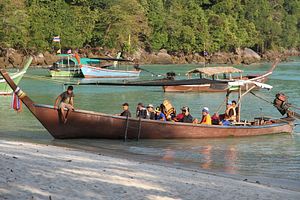The United Nations has set an ambitious target, to end statelessness and the legal limbo that goes with it for at least 10 million people worldwide by 2025. It’s a decision that carries significant ramifications for Southeast Asia, home to hundreds of thousands of people without a country to call home.
Ethnic minorities living on islands in the Andaman Sea dividing Myanmar and Thailand; asylum seekers in Australian-run refugee camps in Nauru and Papua New Guinea; generations of Filipinos who fled the war in their country’s south and have set-up home in the East Malaysian state of Sabah; and the Rohingyas in Myanmar, are among the more prominent examples.
The UN says a baby is born stateless somewhere in the world every 10 minutes, and it has embarked on a campaign that employs the usual array of celebrities like UNHCR Special Envoy Angelina Jolie to increase awareness for the plan.
In an open letter published this week, Jolie and the UN High Commissioner for Refugees António Guterres said the world body was mindful that it first pledged to protect stateless people – who are often denied the rights and services that countries normally offer their citizens – six decades ago.
“Statelessness can mean a life without education, without medical care or legal employment… a life without the ability to move freely, without prospects or hope,” the letter said. “Statelessness is inhuman. We believe it is time to end this injustice.”
However, virtually none of the 10 members of the Association of South East Asian Nations (ASEAN) are a party to UN’s conventions on statelessness, which attempts to ensure stateless women and children their basic rights.
Among those with the most difficult situation are the Moken, maritime gypsies who ply the coastal waters between Thailand and Myanmar and have struggled to make the leap from a traditional way of life in hand-built boats to a 21st century lifestyle.
Catholic priest Father Joe Maier has been working with them since 2008.
“The people were literally starving to death, trapped between the modern world and the Moken world,” Father Maier said. “I have never seen people as poor.”
“The women did not have milk in their breasts to feed their babies and everyone had [intestinal] worms … there were no traditional values … it was a matter of basic survival.”
While not as poor, similar tales of isolation can be found around Palau Gaya near Kota Kinabalu in Malaysia, where thousands of stateless people, often third and fourth generation, have set-up home with scrap timber and sheets of corrugated iron after fleeing the long-running conflict in the Southern Philippines.
They have no passports or identification paperwork like birth certificates. There are no schools, health clinics, or regular work opportunities. Many say they would prefer to stay where they live and become Malaysian, as opposed to returning to the Philippines – a country they know little about.
Of 193 UN member states, just 83 have signed the 1954 Convention relating to the Status of Stateless Persons, and 61 have signed the 1961 Convention on the Reduction of Statelessness.
“Being stateless means you and your children having no legal identity, no passport, no vote, and few or no opportunities to get an education,” Jolie said as the UNHCR launched its “I Belong” campaign in conjunction with the United Colors of Benetton, a clothing company.
“Ending statelessness would right these terrible wrongs. But it would also strengthen society in countries where stateless people are found, by making it possible to draw on their energy and talents. It is both an obligation and an opportunity for governments everywhere to put an end to this exclusion,” she said.
Luke Hunt can be followed on Twitter @lukeanthonyhunt.

































